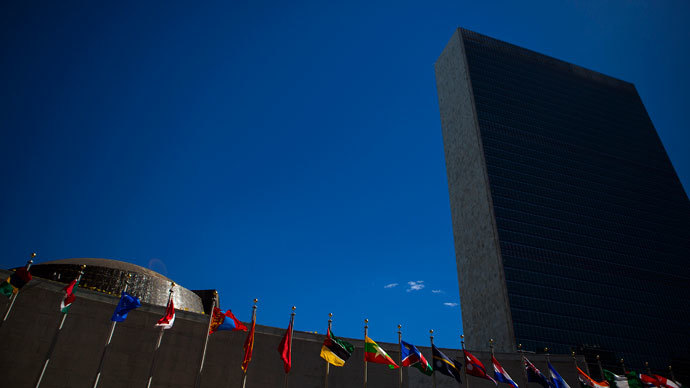Libya example shows UN resolution on Syria might be used to justify broad intervention

The US is pushing for a UN resolution which would give an opportunity to intervene ‘much easier,’ and if we look back at the Libya scenario that possibility looks more real, Middle East expert Mark Almond told RT.
On Sunday the Russian Foreign Minister Sergey Lavrov said that the US is pushing Russia into approving a UN resolution that would allow for military intervention in Syria, in exchange for American support of Syria’s accession to OPCW. He also said that a UN Security Council resolution intended to compel Syria to follow through with the Russia-US plan should not refer to Chapter 7 [provision for military intervention].
RT:So Moscow says the key thing Washington and its partners are seeking is a UN resolution allowing unilateral action against Syria. So what was the point in the Obama administration supporting Syria's chemical disarmament push in the first place?
Mark Almond: There is probably a division of opinion
inside Washington between those who saw a Lavrov initiative as a
get-out clause in that Obama didn't have public support in
America for bombing Syria, and of course there are those in the
military who question the wisdom and the likely effectiveness of
it.
On the other hand there are those who are not concerned with the chemical weapons issue at all, but simply want to see Assad overthrown. But his survival in power, now two and a half years or more into this conflict, is a huge embarrassment to the Western governments in France and Great Britain as well as in America who said that Assad had no popularity and would fall very quickly. Instead we've seen the regime show remarkable resilience and the chemical weapons issue seemed to be a potential battering ram for attacking the Syrian regime which its own local opponents and foreign jihadists were not very effective at overthrowing. But that also raised all sorts of questions about the truth of the allegations, and also about whether bombing is the best way to deal with the problem of chemical weapons.

RT:If Russia and China do allow this threat of force - Chapter 7- to be included in a potential resolution on Syria - will the opportunity to intervene be necessarily used?
MA: It may not necessarily be used, but it certainly makes this opportunity much easier because on past form the Americans, the British and the French will say that resolution authorizes them to do what they want to do, and they will use it in a very expensive way.
Remember over Libya in March 2011 the resolution was presented as
a humanitarian resolution to prevent the Libyan Gaddafi army
forces entering the city of Bengazi. But it was used to justify
more than 6 months of bombing until Gaddafi was overthrown. And
in July, the British Prime-Minister Carry said that over Syria we
don't want a resolution like the one on Libya that would enable
us to engage in regime change, he was trying to reassure Russia
and China.
But precisely because back in March 2011 David Cameron, Obama,
president Sarkozy said this was just a humanitarian resolution to
deal with the immediate crisis in Benghazi, undoubtedly not just
Russia and China, but other countries like India, Brazil, South
Africa are very suspicious that a resolution authorizing force
over chemical weapons [in Syria] could be used to justify a
broader range campaign to remove the regime and install a
different pro-Western government.
Although I have to say I think if we look at what happened in Libya and the chaos that followed, I would be very reluctant to predict that, even if the West was able to pursue a military option in Syria, that it would produce a regime most people in the West would be comfortable with.
The statements, views and opinions expressed in this column are solely those of the author and do not necessarily represent those of RT.












